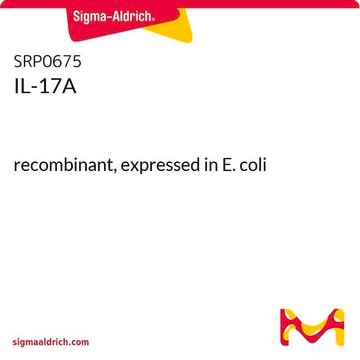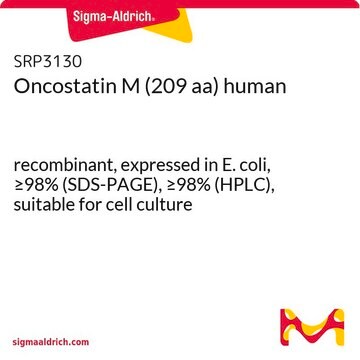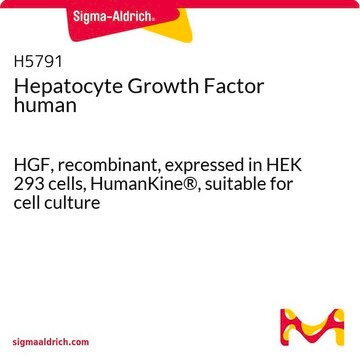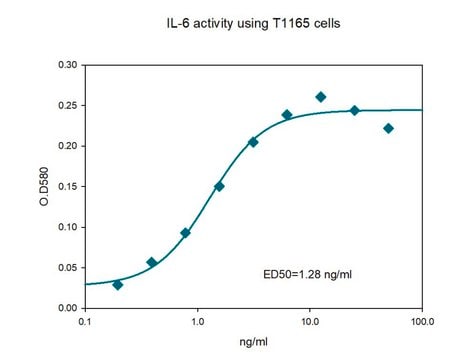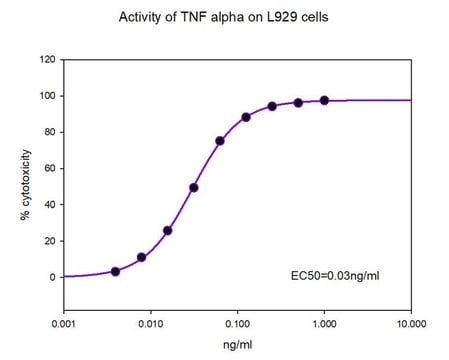Alle Fotos(1)
Wichtige Dokumente
H6541
Oncostatin M human
OSM, recombinant, expressed in HEK 293 cells, HumanKine®, suitable for cell culture
Synonym(e):
OSM
Anmeldenzur Ansicht organisationsspezifischer und vertraglich vereinbarter Preise
Alle Fotos(1)
About This Item
Empfohlene Produkte
Biologische Quelle
human
Qualitätsniveau
Rekombinant
expressed in HEK 293 cells
Assay
≥95% (SDS-PAGE)
Form
lyophilized powder
Wirksamkeit
≤0.1-1.5 ng/mL EC50
Qualität
endotoxin tested
Mol-Gew.
dimer 30 kDa (glycosylated)
Verpackung
pkg of 5X10 μg
pkg of 10 μg
Methode(n)
cell culture | mammalian: suitable
Verunreinigungen
≤1 EU/μg
UniProt-Hinterlegungsnummer
Lagertemp.
−20°C
Angaben zum Gen
human ... OSM(5008)
Suchen Sie nach ähnlichen Produkten? Aufrufen Leitfaden zum Produktvergleich
Biochem./physiol. Wirkung
Oncostatin M (OSM), LIF, G-CSF, IL-6, and CNTF are structurally related members of the same cytokine family sharing similarities in their primary amino acid sequences, predicted secondary structure, and receptor components. OSM is a growth-regulating cytokine, affecting a number of tumor and normal cells. This material was first identified by its ability to inhibit the growth of A375 melanoma cells and other human tumor cells, but not inhibit the growth of normal human fibroblasts. It acts synergistically with TGF β1 to inhibit the proliferation of tumor cells like A375 melanoma cells. It induces an increase in LDL receptor expression and LDL uptake by hepatoma cells. OSM activates synovial fibroblast-like cells to produce urokinase type plasminogen activator. OSM is secreted by macrophages and activated T lymphocytes.
Physikalische Form
Lyophilized from a 0.2 μm filtered solution of 1x PBS.
Hinweis zur Analyse
The activity was determined by the dose-dependent stimulation of the proliferation of human TF-1 cells (humanerythroleukemic indicator cell line)
Rechtliche Hinweise
HumanKine is a registered trademark of Proteintech Group, Inc. and Humanzyme, Inc
Lagerklassenschlüssel
11 - Combustible Solids
WGK
WGK 3
Flammpunkt (°F)
Not applicable
Flammpunkt (°C)
Not applicable
Hier finden Sie alle aktuellen Versionen:
Besitzen Sie dieses Produkt bereits?
In der Dokumentenbibliothek finden Sie die Dokumentation zu den Produkten, die Sie kürzlich erworben haben.
Mong-Lien Wang et al.
Cancer research, 72(22), 6051-6064 (2012-11-10)
Mesenchymal stem cells (MSC) are strongly associated with tumor progression and have been used as novel cell-based agents to deliver anticancer drugs to tumors. However, controversies about the direct involvement of MSCs in tumor progression suggest that MSCs mediate tumor
Huang-Ju Tu et al.
Journal of cellular physiology, 228(5), 983-990 (2012-10-09)
Oncostatin M (OSM) belongs to IL-6 subfamily and is mostly produced by T lymphocytes. High levels of OSM are detected in the pannus of rheumatoid arthritis (RA) patients and it may arouse the inflammation responses in joints and eventually leads
Sema Becerik et al.
Journal of periodontology, 83(10), 1304-1313 (2012-01-18)
The aim of the present study is to investigate gingival crevicular fluid (GCF) and plasma acute-phase cytokines, interleukin-1β (IL-1β), interleukin-6 (IL-6), interleukin-11 (IL-11), oncostatin M (OSM), and leukemia inhibitory factor (LIF) levels in patients with different periodontal diseases. Eighty individuals
Nikolay Ishkitiev et al.
Journal of endodontics, 38(4), 475-480 (2012-03-15)
We have previously differentiated hepatocyte like cells from deciduous tooth pulp stem and extracted third molar pulp stem cells with a protocol that used fetal bovine serum, but it showed high contaminations of nondifferentiated cells. Both the lower purity of
Yu-Fan Chen et al.
Hepatology (Baltimore, Md.), 55(4), 1193-1203 (2011-11-19)
Liver transplantation is the only definitive treatment for end-stage cirrhosis and fulminant liver failure, but the lack of available donor livers is a major obstacle to liver transplantation. Recently, induced pluripotent stem cells (iPSCs) derived from the reprogramming of somatic
Unser Team von Wissenschaftlern verfügt über Erfahrung in allen Forschungsbereichen einschließlich Life Science, Materialwissenschaften, chemischer Synthese, Chromatographie, Analytik und vielen mehr..
Setzen Sie sich mit dem technischen Dienst in Verbindung.